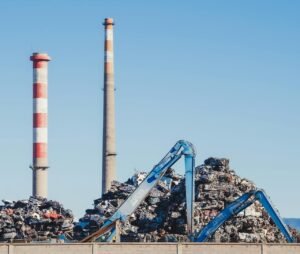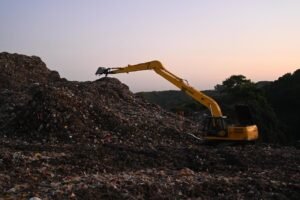A Toxic Welcome: The Scourge of “Recycling” Ships
In the fishing village of Alang, India, children play beside mountains of rusted steel. But these aren’t hills—they’re the carcasses of decommissioned cruise ships from Europe, laced with asbestos and lead. Nearby, in Accra, Ghana, the Agbogbloshie dump smolders with iPhones and laptops, leaching mercury into groundwater while teenagers burn cables for copper scraps.
This is waste colonialism: a global system where rich nations offload 90% of the world’s plastic and e-waste onto the Global South under the guise of “recycling.” While corporations profit, communities from Indonesia to Nigeria pay with their health, land, and lives.
The Dirty Math of Waste Colonialism
- 53% of the EU’s plastic “recycling” is shipped abroad, often illegally.
- 70% of global e-waste ends up in Ghana, India, or Pakistan, where labor costs $3/day.
- Basel Loopholes: The U.S. (which never ratified the Basel Convention) exports 500 containers of plastic waste daily, mostly to countries lacking infrastructure to manage it.
Operation GrassRoots Insight:
Our 2023 investigation found toxic chemicals in 80% of soil samples near Kenya’s “recycling zones”—linked to cancers and birth defects.
The Human Toll: Stories from the Frontlines
1. “We Are Not the World’s Dumpster” – Malaysia Fights Back
In 2018, Malaysia returned 3,000 metric tons of contaminated plastic to the U.S., UK, and Australia. Activist Yeo Bee Yin’s viral speech declared: “We will send it back. We will fight for our dignity.”
2. Life in the Shadow of Smokey Mountain – Manila, Philippines
At the Tondo landfill, families sift through medical waste and diapers for resalables. “My son’s skin blisters when it rains,” says Maricel, 34. “But if we don’t work, we starve.”
3. E-Waste’s Child Labor Crisis – Lagos, Nigeria
14-year-old Chidi burns circuit boards to extract copper. “The smoke makes me cough blood,” he says. UNICEF estimates 100,000+ children work in West Africa’s e-waste dumps.
The Systems Enabling This Crisis
- Racist Trade Deals: Free Trade Agreements (e.g., U.S.-Philippines) classify waste as “commodities,” bypassing environmental laws.
- Greenwashing Lies: “Chemical recycling” projects in the Global South often mask incineration, releasing dioxins.
- Profit Over People: Waste brokers earn $500/ton shipping trash abroad—cheaper than ethical disposal at home.
Science Spotlight:
A 2022 study linked e-waste dumps in Ghana to lead levels 45x higher than WHO limits in children’s blood.
Fighting Back: How Communities Are Reclaiming Power
1. Policy Warriors: Closing Legal Loopholes
- Basel Ban Amendment: Ratified by 98 nations, it bans Global North countries from exporting hazardous waste to the South. But the U.S., Canada, and Japan still resist.
- Kenya’s Plastic Revolution: In 2017, Kenya enacted the world’s toughest plastic ban, slashing waste imports by 80%.
2. Grassroots Innovation: Turning Trash into Autonomy
- Nigeria’s “Wecyclers”: A bike-powered fleet collects e-waste for safe dismantling, creating jobs and cleaner streets.
- India’s Kabadiwalas: Informal waste pickers recycle 30% of Delhi’s waste—triple the efficiency of Western systems.
Operation GrassRoots in Action:
We partner with Ghana’s Green Advocacy Group to turn dumped plastics into eco-bricks for affordable housing—diverting 200 tons/year from landfills.
Your Toolkit to Dismantle Waste Colonialism
- Pressure Corporations: Use our #TakeBackYourTrash petition to demand brands like Amazon and Samsung adopt zero-waste export policies.
- Support Ethical Tech: Buy Fairphone or refurbished devices. Donate old gadgets to vetted e-waste NGOs.
- Amplify Alternatives: Invest in community-designed solutions like Indonesia’s Plastic Pay (swapping trash for rice).
Pro Tip: Host a “Decolonize Waste” workshop using our free toolkit to educate peers on supply chain justice.
The Road Ahead: From Extraction to Repair
Waste colonialism isn’t inevitable—it’s engineered. But from Accra to Jakarta, a movement is rising. As Nigerian artist Emeka Ogboh proclaims: “Our land is not your landfill.”
By fighting for systemic change and uplifting grassroots innovation, we can build a world where waste is owned by those who create it—and dignity isn’t disposable.



